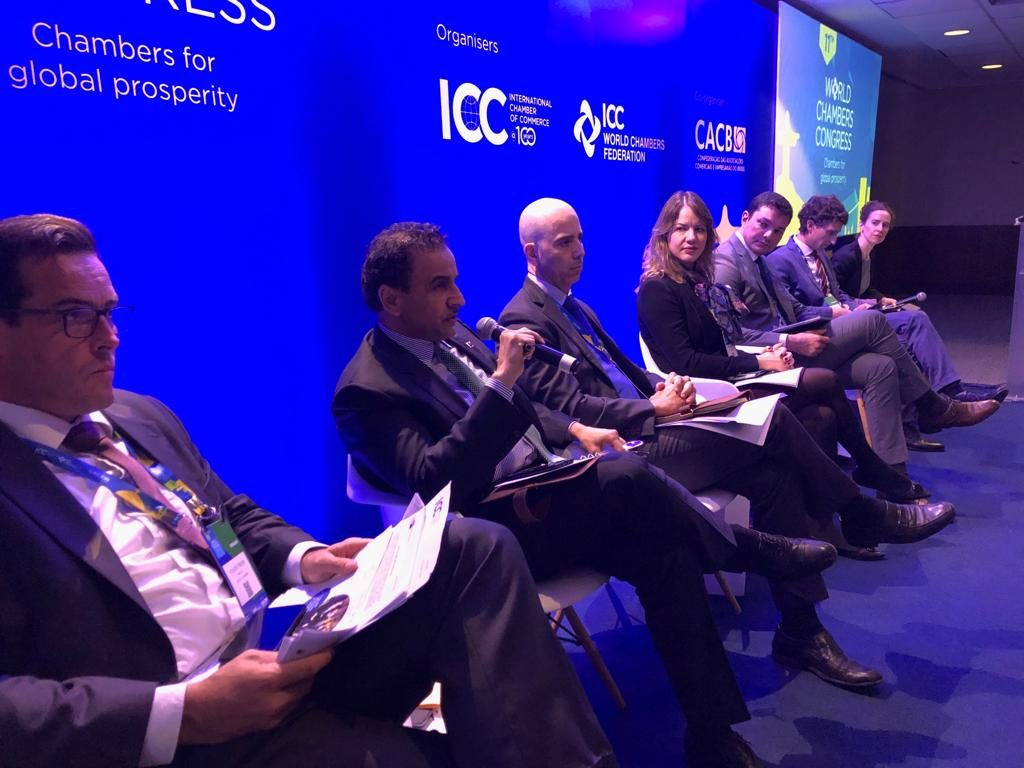Rio de Janeiro – The main challenges for a small- and medium-sized enterprise to start selling their products abroad and the role that chambers of commerce can play in facilitating these processes were the topics of the workshop “SMEs to the world: chambers as facilitators and partners,” which featured Khalid Al Hajri (pictured, with the microphone), board member of Qatar Chamber of Commerce and Industry. The seminar occurred this Thursday (13), the second day of the 11th World Chambers Congress in Rio de Janeiro.
Hajri said that only 8% of Qatar’s small- and medium-sized enterprises (SMEs) export their products. In an interview with ANBA, he talked about the work Qatar Chamber does with SMEs. According to him, the main sectors eligible for export are technology and innovation. “We try and find the right information for these small businesses, so that the entrepreneurs know the market and their target audience, in order to make a matching. We give these information and studies on market intelligence, assist in whatever they need to negotiate or understand how the market work in certain countries. We do what we can to make the best possible match between the company and the new market. That is what we do,” he said.

Other speakers were ambassador José Luis Cancela, representative of Uruguay to the World Trade Organization (WTO); Renata Malheiros Henrique, deputy senior manager of the Entrepreneurship Department at Brazilian Small Business Development Agency (SEBRAE); Fernando Hurtado, president of the Chamber of Commerce of Santa Cruz, Bolivia; Reinaldo Manoel de Lima, head of commercial and communications department at Banco do Brasil trade finance unit; Mathieu Loridan, market analyst at the International Trade Centre (ITC); Volker Treier, deputy-CEO of German Chambers (AHKs). Arancha Gonzáles, executive director of ITC; and moderator Emanuelle Gamma, senior analyst in the WTO.
For Treier, small-sized companies should be free of some taxes and costs to facilitate expanding to the foreign market. “Nationalism and protectionism hinder SMEs in the process of internationalization,” he said.
Reinaldo de Lima talked about Banco do Brasil’s easy loan schemes for SMEs. Arancha Gonzáles ended the panel saying that the three pillars to internationalize small-sized companies are “reducing costs, building confidence and changing culture.” She invited all chambers of commerce to use the platform Trade Help Desk, a cost-free market intelligence tool that is still in beta.
Women

According to Renata Henriques, women have a harder time keeping businesses in Brazil. “Women account for 50% of the new businesses, but this numbers falls to 34% when we see three-year old companies. It’s a cultural thing,” she said. According to her, a great investment opportunity for women are in the digital sector. “Nowadays, many women are starting digital businesses because the cultural impact is smaller – to be clear, people don’t see who are selling, and this reduces the prejudice,” she says. She also said SEBRAE has a project to help women keep their businesses. According to her, 99% of the Brazilian companies are small-sized businesses.
Arancha Gonzáles completed: “Globally, we see this problem persists. Women juggles house chores and a job, which is one point. Another point is that they adapt best digitally because they don’t need a large infrastructure,” she said. Henriques talked about the program Startup Brasil and reiterated that the chambers of commerce are in a position to help Brazilian companies.
The World Chambers Congress ends on Friday (15).
Translated by Guilherme Miranda




